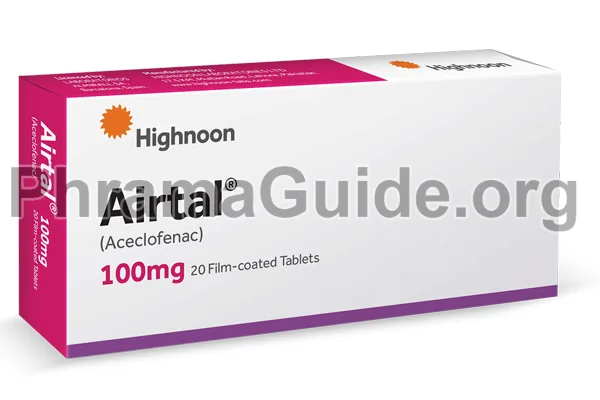Airtal is a non-steroidal anti-inflammatory drug (NSAID) commonly used to relieve pain and reduce inflammation in conditions such as osteoarthritis, rheumatoid arthritis, and ankylosing spondylitis. While it can be effective for pain relief, it also comes with potential side effects. It’s important to use this medication under the guidance of a healthcare professional and to be aware of the possible side effects.
Common Side Effects of Airtal
- Gastrointestinal Issues: NSAIDs like Airtal can irritate the lining of the stomach and intestines, potentially leading to symptoms such as stomach pain, indigestion, heartburn, nausea, vomiting, and diarrhea.
- Dizziness: Some people may experience dizziness or lightheadedness while taking Airtal.
- Headache: Headaches can occur as a side effect.
- Rash: Skin rashes, itching, or hives can develop in response to the medication.
- Edema (Swelling): Swelling of the hands, feet, ankles, or legs can occur, though this is less common.
- Elevated Blood Pressure: Airtal may increase blood pressure in some individuals. Regular monitoring of blood pressure is recommended for those taking this medication.
- Fluid Retention: Some people may experience fluid retention, leading to weight gain and swelling.
- Gastrointestinal Bleeding and Ulcers: In rare cases, NSAIDs like Airtal can cause serious gastrointestinal problems, including bleeding and the development of ulcers. This risk is higher in individuals with a history of gastrointestinal issues, older adults, and those taking the medication for an extended period.
- Kidney and Liver Function: Airtal can affect kidney and liver function, leading to changes in laboratory test results. Regular monitoring may be necessary.
- Allergic Reactions: While rare, severe allergic reactions can occur with Airtal. Seek immediate medical attention if you experience symptoms such as difficulty breathing, swelling of the face, lips, tongue, or throat, or severe skin reactions.
- Asthma Exacerbation: Some individuals with asthma may experience worsening of their asthma symptoms when taking Airtal.

What is Airtal?
Airtal is one of the leading brands of Aceclofenac, manufactured and marketed by Highnoon Laboratories Pakistan.
Airtal : Available Formulations and Strengths
Presently, Airtal is available in Tablet Form
Airtal Tablets : 100mg Strength
What Are The Possible Drug Interactions of Airtal?
- Other NSAIDs: Combining Airtal with other NSAIDs, including ibuprofen, aspirin, or naproxen, can increase the risk of adverse effects, such as gastrointestinal bleeding and ulcers. It’s generally best to avoid using multiple NSAIDs simultaneously.
- Anticoagulants and Antiplatelet Drugs: Combining Airtal with blood-thinning medications like warfarin, and heparin, or antiplatelet drugs like aspirin can increase the risk of bleeding. Your healthcare provider may need to adjust your dose or closely monitor your condition.
- Corticosteroids: The combination of Airtal with corticosteroids (e.g., prednisone) can increase the risk of gastrointestinal bleeding and ulcers. It’s important to use these medications together only under medical supervision.
- Selective Serotonin Reuptake Inhibitors (SSRIs) and Serotonin-Norepinephrine Reuptake Inhibitors (SNRIs): Airtal, when combined with certain antidepressants like SSRIs (e.g., fluoxetine) and SNRIs (e.g., venlafaxine), can increase the risk of bleeding.
- Diuretics: Some diuretics, such as furosemide, can interact with Airtal and reduce its effectiveness. Your healthcare provider may need to adjust your medication regimen.
- Methotrexate: Airtal can increase the blood levels of methotrexate, potentially leading to methotrexate-related side effects. Dosing adjustments and close monitoring are required when using these drugs together.
- Cyclosporine: Combining Airtal with cyclosporine, an immunosuppressive medication, can lead to an increased risk of kidney problems. Close monitoring of kidney function is necessary.
- Lithium: Airtal may increase lithium levels in the blood, potentially leading to lithium toxicity. Monitoring lithium levels is essential when using these drugs together.
- Antihypertensive Medications: Airtal can reduce the effectiveness of some antihypertensive drugs, which may lead to uncontrolled blood pressure. Your healthcare provider may need to adjust your antihypertensive medication.
- Antidiabetic Medications: Airtal can affect blood sugar levels, which may require dose adjustments for antidiabetic medications like insulin or oral hypoglycemic agents.
- Phenytoin: Combining Airtal with phenytoin, an antiepileptic drug, may lead to increased phenytoin levels in the blood, potentially resulting in phenytoin toxicity. Dosing adjustments and monitoring may be necessary.

Leave A Comment